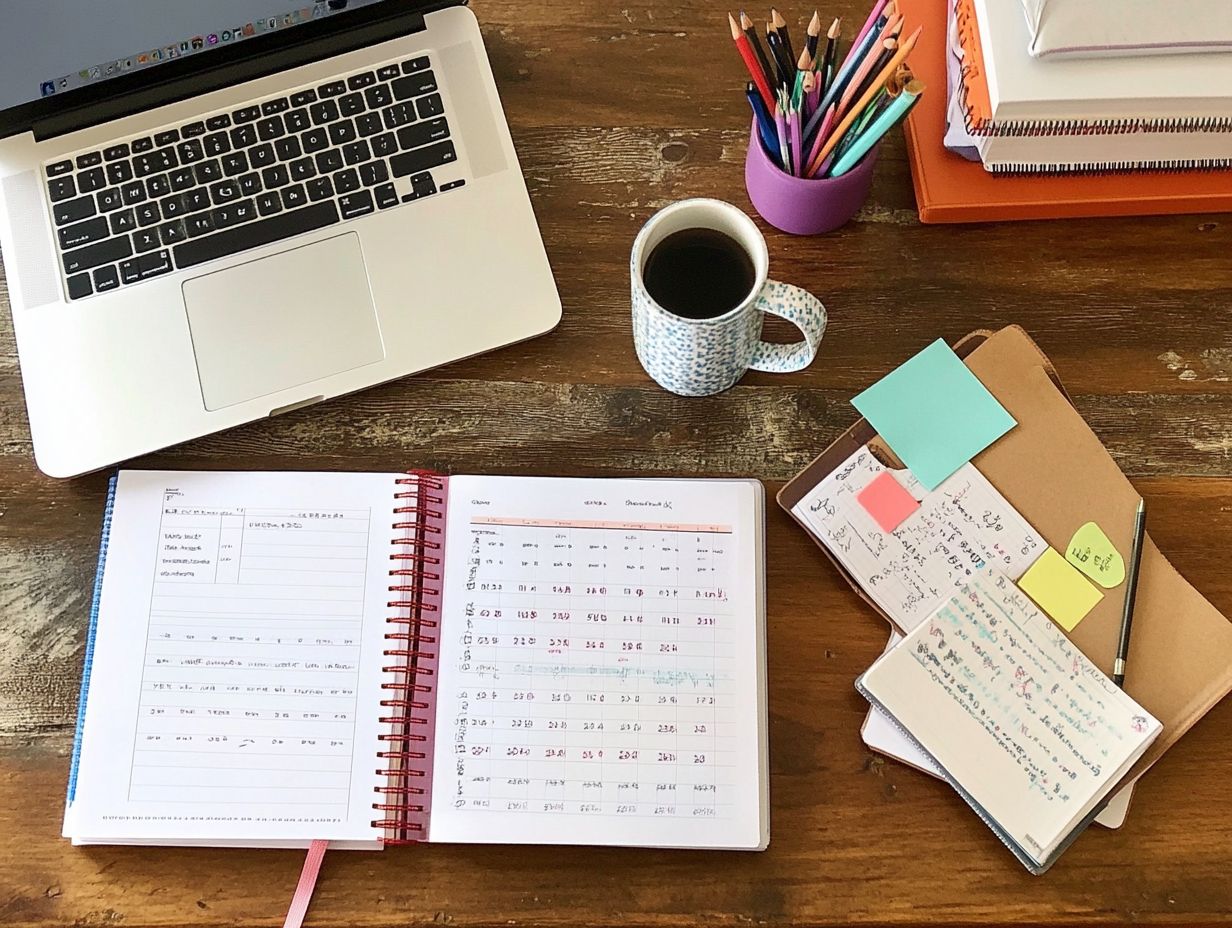how to create a language learning study plan
Creating a language learning study plan is essential for anyone eager to master a new language effectively.
This article delves into the many benefits of having a structured plan, from establishing clear goals to uncovering your motivations. It offers guidance on crafting a flexible study schedule, choosing the right materials, and incorporating a variety of learning methods to keep your experience engaging.
You will learn how to track your progress and adapt your strategies as you advance. Get excited to elevate your language learning journey!
Contents
- Key Takeaways:
- The Importance of a Language Learning Study Plan
- Setting Language Learning Goals
- Creating a Study Schedule
- Choosing Study Materials
- Incorporating Different Learning Methods
- Tracking Progress and Making Adjustments
- Frequently Asked Questions
- What is a language learning study plan?
- Why is it important to have a language learning study plan?
- How do I create a language learning study plan?
- What should be included in a language learning study plan?
- How often should I review and update my language learning study plan?
- What are some tips for sticking to a language learning study plan?
Key Takeaways:

Having a language learning study plan is crucial for success as it provides structure, motivation, and direction. Before creating a study plan, it’s important to identify your goals and motivation for learning a language, including how to plan your language immersion travel.
A well-designed study schedule, incorporating various learning methods and resources, is key to efficient language learning. You’re ready to take the next step!
The Importance of a Language Learning Study Plan
A well thought-out language learning study plan is essential for anyone striving for fluency in a new language. It provides a framework to establish clear objectives and maintain consistent engagement with your learning materials, especially when you know how to successfully complete a language course.
This plan helps you stay focused while enriching your overall experience. By ensuring a thorough exploration of vital grammar rules and expanding your vocabulary, you set yourself up for success on your language journey.
Benefits of Having a Plan
Having a detailed study plan can bring you many advantages, including better organization and heightened motivation. A well-structured plan not only keeps you focused on your objectives but also enhances your time management skills.
This organized approach lets you track your progress effectively, enabling you to monitor your advancements and celebrate your milestones. By breaking down tasks into achievable segments, you can sustain your enthusiasm and commitment.
You’re on the path to transforming your educational journey into a more enjoyable and rewarding experience!
Setting Language Learning Goals
Establishing specific language learning goals is essential for crafting a clear roadmap that directs your study efforts. By breaking down your objectives into manageable tasks, you can monitor your progress and celebrate milestone achievements.
Identifying Your Motivation and Objectives
Understanding your motivation for learning a language is crucial for setting meaningful objectives. By exploring what genuinely inspires you about acquiring a new language, you can craft a personalized roadmap that prioritizes self-study.
For instance, immersing yourself in films, music, or literature from the culture tied to the language can enrich your learning journey. This alignment fosters a deeper understanding and cultivates a sustained commitment to mastering your new language.
Creating a Study Schedule

Establishing a well-organized study schedule is essential for your language learning journey. It allows you to dedicate time for daily practice while balancing study sessions with well-deserved breaks, and integrating language learning into daily life can enhance this process.
This thoughtful approach helps you avoid burnout and keeps your motivation soaring. Let s make this journey fun!
Tips for Designing an Effective Schedule
To design an effective language learning schedule, set manageable weekly objectives. Focus on regular practice to keep your study efforts on track.
A structured approach enhances your learning experience. It allows you to mix various activities, such as reading, writing, and listening.
Create a balanced routine by dedicating specific days to different skills. For instance, use Mondays and Wednesdays for writing to spark creativity, while reserving Tuesdays and Thursdays for listening exercises.
Track your progress with a simple checklist or a digital app. This motivates you to reflect and adjust your goals to maintain momentum.
Choosing Study Materials
Selecting the right study materials is crucial for effective language learning. The right resources impact your ability to learn and achieve your goals.
Choose materials that match your learning style. This will make your journey more enjoyable and rewarding.
Finding Resources that Work for You
Identify learning resources tailored to your needs. This significantly enhances your experience and helps you practice speaking and expand your vocabulary.
Try using language exchange partners for authentic conversations. Language learning apps offer structured lessons that match your progress.
Pick reading exercises based on your interests. This fosters a deeper understanding of context and usage.
Receive personalized feedback from native speakers to correct mistakes and boost confidence.
By mixing different resources, you create a rich learning environment that suits your pace and style.
Incorporating Different Learning Methods
Use various learning methods in your language study routine. This approach boosts your listening skills and writing ability, enhancing your overall fluency.
Embrace diverse techniques for well-rounded mastery. This elevates your language skills to new levels.
Using a Variety of Techniques to Improve Language Skills

Using a variety of techniques can elevate your language learning journey. It improves your listening, speaking, and understanding of grammar rules.
Practice active listening with podcasts or audiobooks to understand pronunciation better. Speaking exercises, like language exchange meetups, let you use vocabulary in real life.
Structured grammar drills help you form sentences correctly. Interactive language learning apps create a dynamic educational experience.
These methods emphasize consistent practice. Immersing yourself in different contexts reinforces your knowledge and fosters a holistic approach to language learning.
Tracking Progress and Making Adjustments
Track your progress to understand your development. This helps you make informed adjustments to your study plan.
This approach ensures tangible results while improving your language skills.
Measuring Success and Making Changes as Needed
Measuring success in language learning involves more than just logging hours. It s about how effectively you engage in your study sessions and the strategies you select.
To understand your progress, gather feedback from online tutors. Their insights can highlight areas needing improvement.
Quizzes and assessments are great tools to measure knowledge retention. They help identify strengths and weaknesses.
Use the insights from assessments and tutoring to make meaningful changes. Focus on challenging aspects of the language while celebrating your achievements.
Frequently Asked Questions
What is a language learning study plan?
A language learning study plan is a structured and organized plan that outlines the specific steps and strategies one will take to learn a new language. It serves as a roadmap to guide learners in setting achievable language goals.
Why is it important to have a language learning study plan?

Having a language learning study plan helps learners stay focused and motivated, ensuring progress toward their goals. Additionally, understanding how to use language learning software effectively aids in tracking progress and making necessary adjustments to study methods.
How do I create a language learning study plan?
To create a language learning study plan, start by setting clear and achievable goals. You can find valuable insights on how to create a language learning study plan that includes determining your learning style and choosing appropriate study materials. Then, schedule regular study sessions, incorporating various activities such as reading, writing, speaking, and listening.
What should be included in a language learning study plan?
A language learning study plan should include specific goals, a study schedule, a list of study materials, and various learning activities. To enhance your approach, consider how to develop a language learning checklist. It should also incorporate a system for tracking progress and making necessary adjustments.
How often should I review and update my language learning study plan?
It is recommended to review and update your language learning study plan regularly, such as every week or month. This allows you to track progress and make any changes needed, ensuring you stay on track toward your language learning goals. For tips on maximizing your efforts, check out how to make the most of your language course.
What are some tips for sticking to a language learning study plan?
To stick to a language learning study plan, set realistic goals and create a study schedule that fits your lifestyle. Additionally, consider how to create an immersive language learning environment by finding accountability partners or joining a language learning community for support and motivation. Staying consistent is key to your success!





